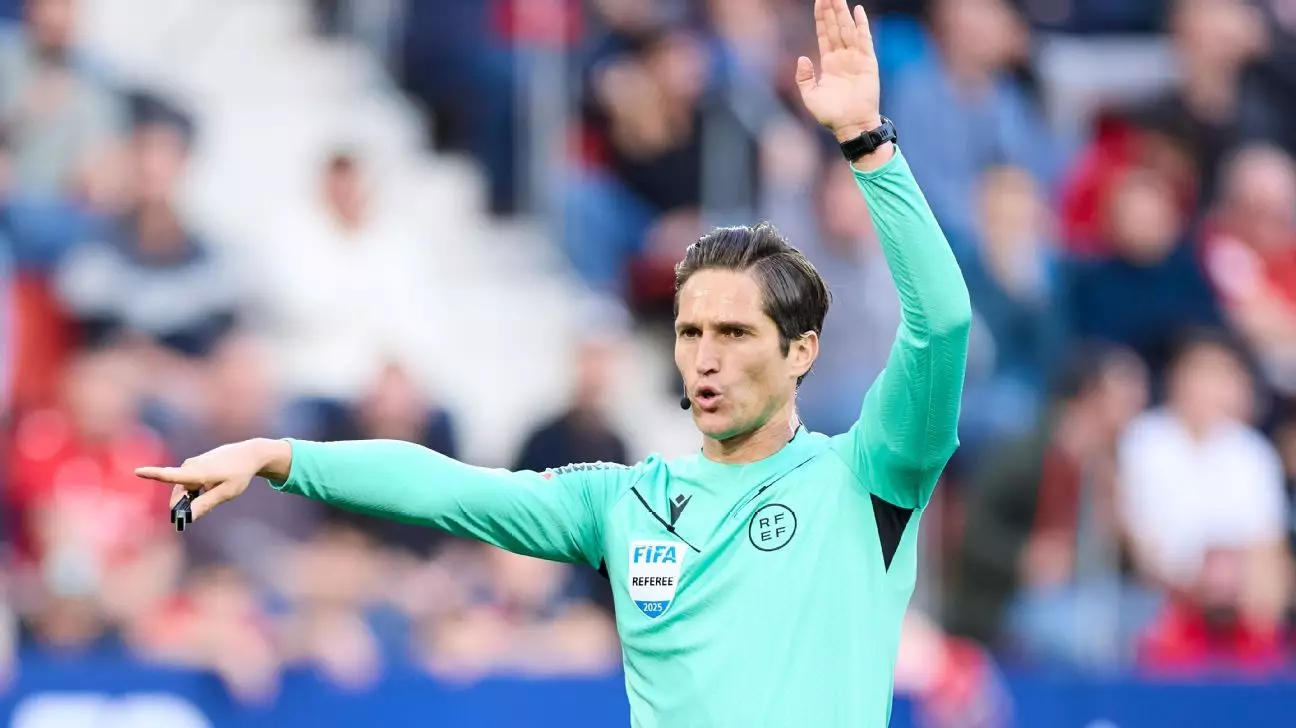In a gripping encounter between Real Madrid and Osasuna that ended in a 1-1 draw, the decision by referee José Luis Munuera Montero to send off Jude Bellingham has sparked intense scrutiny and unrest within the football community. This incident is not merely a routine referee decision but part of a broader narrative involving alleged conflicts of interest and systemic critiques of officiating in Spanish football. The Spanish Football Federation (RFEF) has publicly acknowledged the emergence of conflicting reports surrounding Munuera’s affiliations, particularly his association with a company named Talentus Sports Speakers. This situation raises critical questions regarding both the integrity of officiating and the transparency within the football governance system.
Reports have surfaced suggesting that Munuera’s company holds business relationships with various football entities, including LaLiga and UEFA, intensifying the scrutiny placed on his officiating. Such associations imply a potential compromise in the impartiality expected from referees who are tasked with ensuring fair play during matches. In a time when football’s integrity is being scrutinized worldwide, this revelation could have far-reaching implications, not only for Munuera but also for the governing bodies involved. The RFEF’s commitment to transparency, as voiced in their statement about commencing a full analysis into these accusations, is commendable; however, it raises the concern of whether such actions are merely a reaction to media scrutiny rather than a proactive measure to restore trust in officiating.
In a spirited defense, Munuera took to social media to assert that his company has not engaged in any financial transactions with sporting entities since its establishment. He condemned the surrounding coverage as exaggerated and accused the media of launching a “disproportionate attack” on the refereeing community. His legal threats are emblematic of the heightened tensions that officials face when operating under a magnifying glass. Referees have always occupied a contentious space in football, but these recent developments could further alienate them from the public and the clubs they serve.
Munuera’s claim that his business is dedicated to helping young graduates explore career opportunities and develop the values of sportsmanship points towards a commendable goal. However, the mere existence of potential conflicts raises doubts about the credibility of officiating in Spain. It is essential for individuals in positions of authority, especially referees, to maintain an unassailable moral high ground to foster confidence from players, clubs, and fans alike.
Real Madrid expressed their dissatisfaction with Munuera’s decision to issue a red card, viewing it as part of a broader decline in the quality of officiating within Spanish football. Their formal complaint lodged against the referee’s decisions comes during a period of increasing pressure on the federation to rectify inconsistencies in officiating judgments. Football clubs, especially storied ones like Real Madrid, possess a unique platform to demand accountability, but these calls for scrutiny must be rooted in fair criticism rather than emotional outbursts following controversial decisions.
The fact that numerous clubs are now openly supporting referees, as demonstrated by Atlético Madrid’s affirmation of their reliance on officiating integrity, illustrates the polarization of opinions within the league. With offensive rhetoric growing increasingly prevalent, there is a danger that football could spiral into a culture of blame, where referees become scapegoats for teams’ performances and decision-making failures.
As the RFEF continues its investigation into the matter surrounding Munuera, the real challenge lies in ensuring that the foundation of Spanish football remains untarnished. Strong and impartial refereeing must be prioritized, alongside transparent governance that ensures all entities, including referees, operate without zany conflicts of interest.
The path forward should involve not just reactive measures to scandals but also proactive initiatives to educate players, clubs, and the public on the complexities and challenges of officiating. By fostering a culture of respect for referees and emotional maturity in handling controversial moments, the football community can work towards a future where integrity and accountability flourish—all serving as a timely reminder that the game is bigger than any single match or decision.

